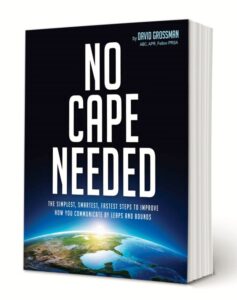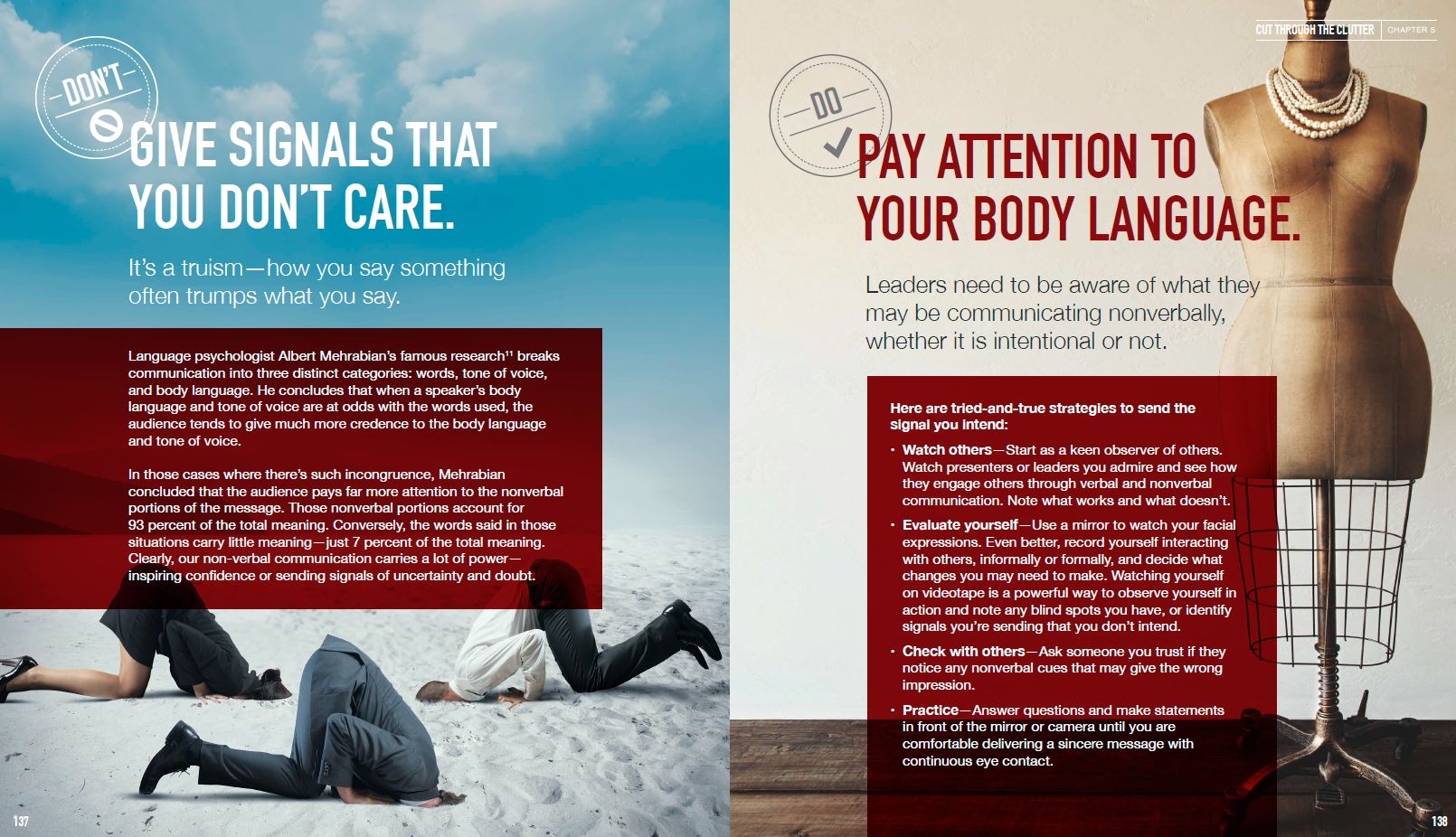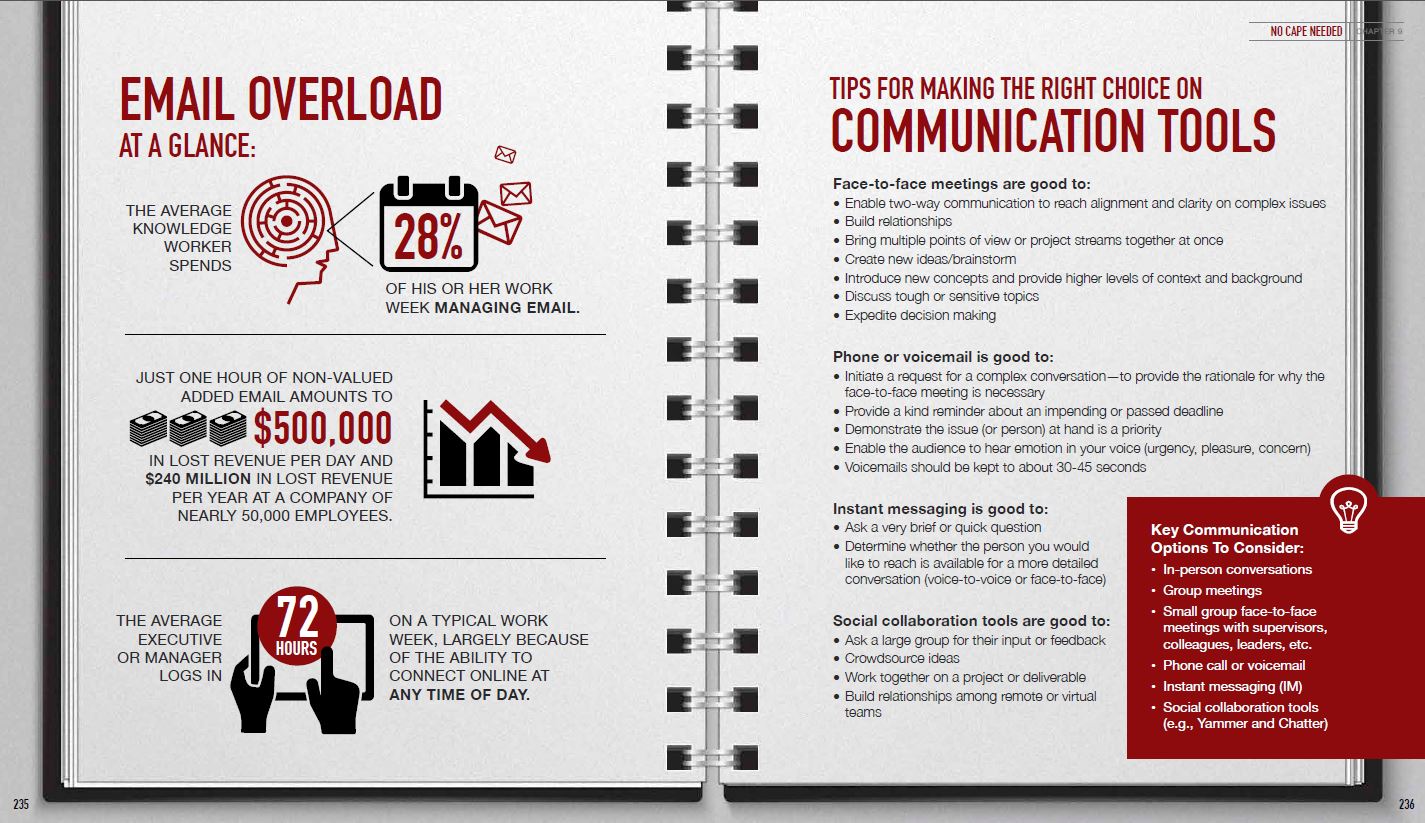No Cape Needed
Do you know the most common communication mistakes leaders make?
What practical steps can you take right now to be a more effective communicator?
What is the most common mistake we make when using email?
David Grossman is a communications expert. Both David and the firm he founded in 2000, The Grossman Group, have received numerous awards. Prior to founding the firm, he was director of communications for McDonald’s, and he teaches the only graduate course on internal communications in the U.S. at Columbia University.
What you notice when you pick up David’s latest book, No Cape Needed: The Simplest, Smartest, Fastest Steps to Improve How You Communicate by Leaps and Bounds, is that it’s stunning as a physical book. Full of colorful graphics, gorgeous photography, and digestible information, it is one of the reasons I still enjoy the physical book. Not only is it a gorgeous book, but it is full of immediately actionable, useful information. I recently asked David to share some of the wisdom from his book and his consulting practice.
Communication is a Superpower
Question: As a kid, you wanted to have superpowers. As an adult you say, “Communication really is a superpower.” Explain why you elevate communication to that status.
I wholeheartedly believe that effective communication is really a way to make a difference.
You can use communication to make others feel good about their jobs, to be engaged and excited, to help someone who’s having a hard time get through a rough patch, or to inspire a team. And in essence, you can use communication to make substantial changes that aren’t just about helping a company or team go from ‘good to great’ but instead create a lasting legacy through a new strategic direction.
A lot of people don’t think they can communicate well or don’t think they can develop the skill. But the truth is that it just takes practice. If leaders at all levels of their organizations come to realize that, then great things can happen for their companies. And they can become heroes of their own.
3 Steps to Improve Your Communication
In your new book, No Cape Needed, what are the top three steps you recommend for improving communication?
1. Understand your audience.
To truly move employees to action, we have to know what they care about and get into their mindset. As leaders we spend much of our time and effort setting business goals and developing plans to achieve them. Yet the most important element behind everything is your team. If they don’t understand where they fit in, all of our lofty goals will go nowhere.
2. Plan, and then communicate regularly.
Leaders often mistakenly assume that as long as they have ideas, a vision, and a sense of purpose, that will be enough to lead the way forward. If only it were that easy. In truth, good leaders know the importance of planning and clearly spelling out the path ahead. You can wing your communications and take a chance on the results or be planful and purposeful to increase your chances of success ten-fold.
3. Listen and create dialogue.
True communication comes from a shared understanding of meaning. Ask open-ended questions. Listen. Listen some more. Check for understanding.
3 Common Communication Mistakes
What are some of the common mistakes leaders make when they communicate?
1. They don’t set the context.
Leaders often jump into a message without helping employees understand where they’re coming from. Instead, your team needs to have a core understanding of what matters to the business and why. That means they’ll need information on the strategy and objectives, the reasons behind recent decisions, the priorities, the employee’s role for the future, and some sense for what’s at stake for the business.
2. They shut ideas down.
Leaders often fall into the trap of thinking they have all the answers. Yet the fastest way to lose employees’ confidence and trust is to make them feel their opinions don’t matter. We all need to resist our egos.
3. They talk, talk, talk.
Employees are bombarded with information but starved for meaning. You don’t want to just talk at them, or they will just tune out. Instead, it’s critical to truly listen and create dialogue. I try to approach each dialogue by thinking, “This person can teach me something.”
Understand the Power of Story
You often talk about the power of a good story. Tell us a little more about the power of story and what aspiring storytellers can learn from your experience.
Growing up, I asked a lot of questions. I was the kind of kid who wanted to know how and why and what. I drove most adults crazy with my questions. Now that I have kids (I have a 3-year-old and a 5-1/2-year old going on 12), I’ve realized that payback is hell! And that in many cases I am wholly unprepared for the questions my girls ask. I love that they’re curious; I often wish I had better answers. Parenting is the toughest job I’ve ever had; it’s also the best job.
 I share this with you because we all tell stories naturally that illustrate who we are as a person, what we do, what we believe in. Yet at work, something happens. Stories get lost, and pie charts and copy-heavy slides take over.
I share this with you because we all tell stories naturally that illustrate who we are as a person, what we do, what we believe in. Yet at work, something happens. Stories get lost, and pie charts and copy-heavy slides take over.
I think it’s helpful to remember that we follow leaders because of how they make us feel. And stories are the most powerful way leaders can make an emotional connection with employees. In fact, neuroscientists and cognitive psychologists have found this to be true: A fact wrapped in a story is 22 times more memorable. So I say, don’t get overwhelmed by the data and statistics. Stories rule.
In your book, you also asked various leaders about the best career advice he or she ever received. I was a participant. What did you learn from this process? Anything stand out?
I learned that your advice was the smartest advice featured in the book. (Just kidding!) Seriously, I learned two things: The advice was as diverse as the leaders themselves, and it varied from person to person. It was another reminder of how personal the leadership journey is. And what it takes to lead varies. There’s no magic formula to authentic leadership or a certain “type” who’s most effective.
Second, much of what was shared was connected to being a good person. We can’t lose sight of how important that is in business today. Being someone who is kind and caring and thoughtful is a differentiator.
Email Tips
David, you spend pages in the book devoted to email. What’s the most common mistake we make using email? Any tips to be more effective using email?
A major mistake is using email to hide. If I could give just one piece of advice to leaders, it is to first consider the best way to communicate – and often that means not sending an email but instead calling a (brief) meeting or picking up the phone. Think of all the great work that happens through personal interactions. When email becomes simply one of the many communication choices, you’ll naturally begin to use it more productively, relevantly, and politely. With this in mind, here’s one simple fix: Keep in mind that email is never a substitute for a conversation, even if it’s a quick one.
No Cape Needed: The Simplest, Smartest, Fastest Steps to Improve How You Communicate by Leaps and Bounds



